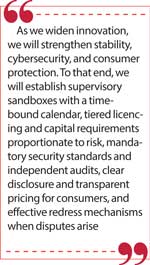Sunday Feb 22, 2026
Sunday Feb 22, 2026
Wednesday, 17 September 2025 00:20 - - {{hitsCtrl.values.hits}}

When banks, fintechs, and telecom networks interoperate, citizens can pay, save, borrow, and receive Government benefits and services on any compliant platform
 The world economy is entering a new phase, with growth and innovation increasingly driven by Asia’s rising economic powerhouses and by global waves of technological disruption. For Sri Lanka, a nation whose economy remains anchored in agriculture and whose export markets are still concentrated in Europe and America, this transition presents critical challenges but also unprecedented opportunities. To find our place in this changing order, we must embrace innovation as the pathway to resilience, competitiveness, and inclusion.
The world economy is entering a new phase, with growth and innovation increasingly driven by Asia’s rising economic powerhouses and by global waves of technological disruption. For Sri Lanka, a nation whose economy remains anchored in agriculture and whose export markets are still concentrated in Europe and America, this transition presents critical challenges but also unprecedented opportunities. To find our place in this changing order, we must embrace innovation as the pathway to resilience, competitiveness, and inclusion.
The Government has set a $ 15 billion digital-economy target for 2030, a clear signal as to the direction we need to move in. With digital currently contributing 3–5% of the GDP, we must lift it to about 12% within the decade, overtaking agriculture’s present 8.3% share. Agriculture will remain vital, and be strengthened through digital tools, but Sri Lanka must now become a digital-first economy.
Achieving this goal will require more than digitising a few sectors in isolation. It means rewiring the entire economy, so that citizens, businesses, and Government alike can transact, collaborate, and compete through digital platforms. While progress may take place in silos, the real value of digitalisation emerges when primary centres of innovation connect with other pillars of the economy.
The task ahead requires close partnership. The Government will provide policy vision and regulatory clarity; adoption and innovation must be driven by banks, fintechs, entrepreneurs, and technology providers.
Real progress will come when regulation and innovation move together under a common roadmap. The upcoming Sri Lanka FinTech Summit is therefore a critical opportunity for our nation to build that alignment by bringing stakeholders to the same table, setting direction, and demonstrating Sri Lanka’s readiness to compete, collaborate, and execute tangible reform in the digital age.
Co-creating a vision for a digital-first economy
Sri Lanka’s starting point is clear. We remain a predominantly cash-based economy, with approximately Rs. 1.3 trillion in notes and coins circulating and a large share of day-to-day transactions still settled in cash. Much of Government service delivery continues to rely on paper forms and manual workflows. This creates friction, limits transparency, and slows participation in the modern economy, conditions that create opportunities for inefficiency and corruption.
Our vision for 2030 is to change that foundation. A digital-first economy is one in which the majority of retail payments, person-to-person, person-to-business, business-to-business, and cross-border remittances are executed digitally end-to-end. When 50% of retail transactions are digital, we can credibly say the economy has crossed the threshold.
Global benchmarks show that this is achievable. The country-wise digital payment adoption rates for retail payments are: India ~80%–91%, Australia ~90%–94%, Singapore ~75%–85%, and Nepal ~30%. Each of these nations followed different strategies. By drawing lessons from these global transformations and adapting them to the local context, Sri Lanka can also rapidly achieve comparable adoption rates.
 This transformation includes the Government itself. We must move to paperless systems across public services so that applications, approvals, notifications, and records are handled end-to-end on secure platforms. Digital systems will become the default for internal workflows, financial management, procurement, and service delivery. Civil servants will be trained and equipped to use data, automate routine tasks, and provide faster, more transparent services to the public. Paper records will remain a fallback, not the norm.
This transformation includes the Government itself. We must move to paperless systems across public services so that applications, approvals, notifications, and records are handled end-to-end on secure platforms. Digital systems will become the default for internal workflows, financial management, procurement, and service delivery. Civil servants will be trained and equipped to use data, automate routine tasks, and provide faster, more transparent services to the public. Paper records will remain a fallback, not the norm.
Fintechs are central to achieving this vision. They expand the reach of digital payments and financial services to every citizen and enterprise from urban retail to the informal economy, from farmers and micro-merchants to exporters and freelancers. By lowering onboarding costs, enabling instant payments, and offering simple interfaces in local languages, fintechs can accelerate adoption and bring everyday commerce onto trusted digital rails.
The Government’s role is to provide the rails, clear policy and enabling architecture to unlock scale. The immediate levers are a national interoperable digital ID, fast and low-cost eKYC, open banking interfaces, and supervised regulatory sandboxes. With consent and anonymisation, privacy-preserving data can enhance credit scoring to include SMEs, gig workers and first-time borrowers, while streamlined merchant onboarding and acceptance in high-volume use cases such as transport and utilities drive nationwide adoption.
GovPay, which has already processed over Rs. 100 million in transactions, demonstrates what is possible. Other immediate opportunities include the integration of digital payments into public transport. Our task now is to connect these building blocks, remove duplication, and create a predictable pathway from pilot to national rollout.
Banks are anchors of trust and stability. By opening secure APIs, partnering on merchant acceptance, and co-developing digital credit and savings products, they ensure that innovation is safe, compliant, and accessible at scale. When banks, fintechs, and telecom networks interoperate, citizens can pay, save, borrow, and receive Government benefits and services on any compliant platform. Healthy competition between institutions will drive innovation; collaboration will ensure inclusion and stability. Both are necessary.
Fintechs as multi-sector catalysts of growth
Fintechs are already widening access to digital payments, but their true potential extends well beyond payments. Sri Lanka must now enable models common in other markets: fully digital banking experiences, app-native neo-banks, and instant, low-friction onboarding for consumers and merchants.
Digital credit and peer-to-peer lending can responsibly expand working capital for SMEs and informal workers. Robo-advisory and digital brokerages can open low-cost wealth products for first-time savers. Insur-tech can evolve from standard monthly policies to usage-based and embedded cover, whether a commuter ride, an e-commerce purchase, or a logistics delivery backed by digital claims that pay out quickly and fairly.
As we widen innovation, we will strengthen stability, cybersecurity, and consumer protection. To that end, we will establish supervisory sandboxes with a time-bound calendar, tiered licensing and capital requirements proportionate to risk, mandatory security standards and independent audits, clear disclosure and transparent pricing for consumers, and effective redress mechanisms when disputes arise. Such safeguards will allow innovation to earn trust and grow sustainably.
Building the rails for inclusive adoption
To compete globally, Sri Lanka must signal regulatory clarity and openness to investment. A co-created national fintech strategy, with the Central Bank of Sri Lanka, banks, fintechs, academia, and civil society plus streamlined approvals and clear licensing will unlock venture and strategic capital, along with technology and market access. In parallel, we will pursue export orientation and interoperability aligning with regional standards for cross-border remittances, QR acceptance, and open-API data sharing, so any Sri Lankan citizen or business can transact seamlessly across Asia.
Artificial Intelligence sits at the heart of this transformation. Many of the opportunities described above, fraud analytics, credit scoring, compliance automation, and customer support are already AI-enabled globally. Sri Lanka will therefore expand AI infrastructure through partnerships with hyperscale providers, establish a Centre of Excellence for AI, launch a National AI Expo, and create an AI Fund alongside workforce-wide upskilling for engineers, civil servants, and the general public.
A key priority will be in building Sinhala and Tamil language datasets in partnership with universities and industry, with open-source benchmarks so global platforms can localise responsibly. These initiatives are already underway and represent crucial steps toward democratising access to AI and LLM technology for all citizens.
The Sri Lanka FinTech Summit will operationalise our agenda via a National Fintech Roadmap that specifies reforms, responsibilities, and measurable milestones. Broad stakeholder engagement is essential to deliver results within the coming year. In parallel, the Summit will target FDI and strategic partnerships and advance public understanding of fintech’s role in expanding access to services.
Citizens will choose digital when services are easy, reliable, and visibly more convenient, offering faster processing, simpler access, fair pricing, and clear redress. By building this shared understanding across institutions, regulators, industry, and the public, we can advance adoption that is inclusive, transparent, and grounded in trust.
If we execute on this agenda together, Government laying the rails, banks providing the stability, fintechs supplying the innovation, and citizens shaping adoption; Sri Lanka can position itself not merely as a participant in the global digital economy, but as a key player in its next wave of growth.
(The writer is the Digital Economy Deputy Minister.)